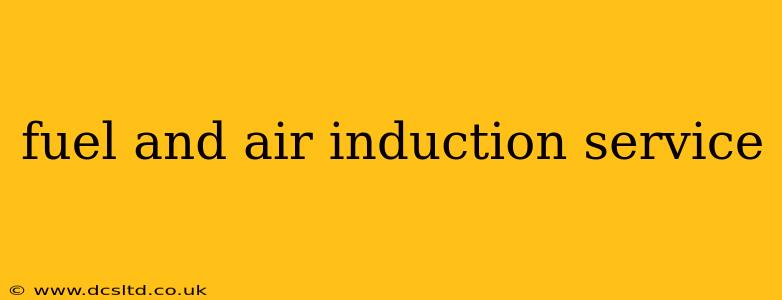Maintaining optimal engine performance requires regular attention to crucial systems, and among the most critical are the fuel and air induction systems. These systems work in tandem to deliver the precise mixture of fuel and air necessary for efficient combustion. A well-maintained fuel and air induction system ensures optimal power output, fuel economy, and reduced emissions. This comprehensive guide explores the vital aspects of fuel and air induction service, answering common questions and providing valuable insights for car owners and enthusiasts.
What is a Fuel and Air Induction Service?
A fuel and air induction service encompasses a thorough inspection and cleaning of all components involved in delivering fuel and air to your engine. This includes everything from the air filter and intake manifold to the fuel injectors and fuel lines. The service aims to identify and rectify any issues that may be hindering optimal performance, ultimately leading to a more efficient and powerful engine. It's a preventative maintenance measure that can save you money in the long run by preventing more serious, costly repairs.
What are the Components of a Fuel and Air Induction System?
Understanding the components involved helps you appreciate the importance of a regular service. Key components include:
- Air Filter: This crucial component prevents dirt, debris, and other contaminants from entering the engine. A clogged air filter restricts airflow, leading to reduced power and fuel efficiency.
- Intake Manifold: This system distributes the air-fuel mixture evenly to each cylinder. Deposits and blockages can disrupt this process.
- Throttle Body: Controls the amount of air entering the engine. Buildup on the throttle body can affect its responsiveness.
- Fuel Injectors: These precisely meter the fuel into the combustion chamber. Clogged or faulty injectors lead to poor fuel atomization and inefficient combustion.
- Fuel Rail: This distributes fuel from the fuel pump to the injectors. Leaks or blockages in the fuel rail can significantly impact engine performance.
- Fuel Pump: This component delivers fuel under pressure to the injectors. A failing fuel pump can result in a lack of power and stalling.
- Mass Airflow Sensor (MAF Sensor): This sensor measures the amount of air entering the engine, allowing the engine control unit (ECU) to adjust the fuel delivery accordingly. A dirty or faulty MAF sensor can cause inaccurate fuel-air mixture calculations.
How Often Should I Get a Fuel and Air Induction Service?
The recommended frequency for a fuel and air induction service depends on several factors, including driving conditions, the type of fuel used, and the vehicle's age. However, a good rule of thumb is to have this service performed every 12-24 months or every 12,000-24,000 miles. If you frequently drive in dusty or dirty conditions, more frequent service may be necessary.
What are the Signs I Need a Fuel and Air Induction Service?
Several signs indicate that your fuel and air induction system requires attention:
- Reduced Engine Power: A noticeable decrease in acceleration or power.
- Poor Fuel Economy: A significant drop in miles per gallon.
- Rough Idle: The engine shakes or vibrates excessively at idle.
- Hesitation or Stuttering: The engine hesitates or stutters during acceleration.
- Check Engine Light: The illumination of the check engine light often indicates a problem within the fuel or air induction system.
What is Involved in a Typical Fuel and Air Induction Service?
A thorough service typically includes:
- Air Filter Replacement: Replacing the air filter with a new one is the most basic part of the service.
- Throttle Body Cleaning: Cleaning the throttle body to remove carbon deposits and ensure smooth operation.
- MAF Sensor Cleaning: Carefully cleaning the MAF sensor to restore its accuracy.
- Fuel Injector Cleaning: This can involve using specialized cleaning solutions or ultrasonic cleaning techniques. Sometimes, injector replacement may be necessary.
- Intake Manifold Cleaning (if necessary): Cleaning the intake manifold to remove accumulated carbon deposits and improve airflow.
Can I Do a Fuel and Air Induction Service Myself?
While some aspects, like air filter replacement, are relatively straightforward DIY tasks, more complex procedures like fuel injector cleaning or throttle body cleaning require specialized tools and knowledge. Attempting these procedures without the proper expertise could potentially damage your engine. It's often best to leave these tasks to qualified mechanics.
How Much Does a Fuel and Air Induction Service Cost?
The cost of a fuel and air induction service varies widely depending on the vehicle, the extent of the service required, and the location. It's best to contact your local mechanic or dealership for an accurate quote.
By understanding the importance of regular fuel and air induction service, you can ensure your vehicle operates at peak efficiency, providing optimal power, fuel economy, and longevity. Remember to consult your vehicle's owner's manual for specific recommendations and always choose a qualified mechanic for any complex repairs.
